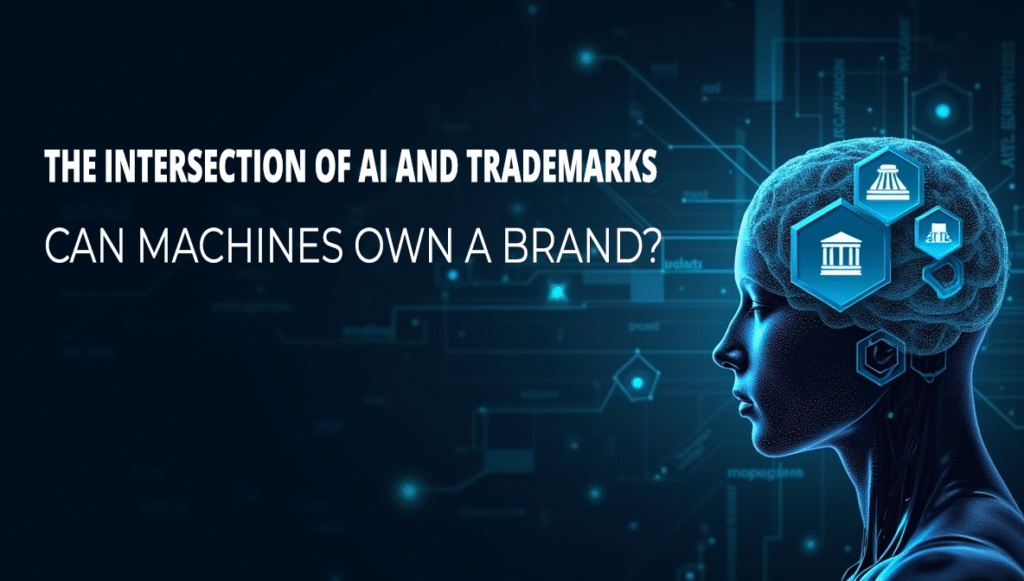
Artificial Intelligence (AI) is no longer just a futuristic concept it is a transformative force across industries, including the creative and branding sectors. From AI-generated logos, brand names, taglines, to product designs, businesses are increasingly relying on machines to innovate brand identities.
This rapid advancement raises an important legal query:
Can AI, as a non-human entity, own a brand or a trademark?
This blog explores this question through the lens of Indian trademark law, global IP frameworks, and the evolving discourse around AI and intellectual property.
What is a Trademark and Who Can Own It?
Under the Trade Marks Act, 1999, a trademark is any mark capable of distinguishing goods or services of one entity from those of others. It can take the form of:
- Words or Names
- Logos and Designs
- Sounds or Smells
- Shapes and Packaging
Ownership Under Indian Law
Section 18 of the Trade Marks Act, 1999 allows “any person claiming to be the proprietor of the trademark” to apply for registration. The term “person” includes:
- Natural persons (individuals)
- Juristic persons (companies, LLPs, partnerships, associations)
An AI system is neither a natural nor a juristic person, which precludes it from claiming proprietorship under the existing statutory framework.
Can AI Legally Own a Trademark?
In simple terms No, AI cannot own a trademark because:
- AI lacks legal personality (a prerequisite for owning rights under law).
- AI systems cannot enter into contracts, file applications, or enforce rights.
- IP rights are inherently linked to accountability, including the ability to be sued for infringement, something machines are not capable of.
Even globally, the trend remains the same. AI-created outputs, including brand elements, are owned by the human or organization that utilizes the AI either by virtue of ownership of the AI system or via licensing terms.
Who Owns AI-Generated Trademarks or Brand Elements?
Ownership of AI-generated brand assets rests with:
- The User of the AI Tool: If a business uses an AI platform to generate a logo or brand name, the rights typically vest with the user, subject to the AI tool’s terms of use.
- The Developer/Provider of the AI: In cases where licensing terms reserve IP rights for the developer, ownership can remain with them unless expressly transferred.
- Commissioning Party: If an organization commissions a developer to create a customized AI that generates brand assets, ownership clauses in the contract will dictate the rights.
Practical Tip:
Businesses should ensure clear contractual agreements with AI developers, service providers, and platforms to avoid ambiguity over IP rights in AI-generated outputs.
Emerging Challenges at the Intersection of AI and Trademarks
1. Authorship and Originality Concerns
Trademark registration requires distinctiveness and originality. But who is the ‘author’ when an AI generates a name or design? Human oversight in the creative process may still be necessary to establish originality and distinctiveness for registration.
2. Liability and Enforcement
Trademark rights come with the right to enforce against infringement. If the creator is AI, the liability to enforce or defend those rights cannot rest with a machine. This reinforces the need for a human or legal entity to own the mark.
3. Algorithmic Bias and Consumer Confusion
AI-generated branding could inadvertently replicate existing trademarks or culturally sensitive symbols, leading to infringement risks or consumer confusion. Due diligence and trademark searches remain critical even when using AI.
4. Legislative and Policy Gaps
There is currently no legislation in India or internationally that provides for AI to be recognized as an IP rights holder. However, WIPO and other international bodies are actively debating frameworks for AI and IP governance.
5. Data Privacy and IP
AI models often train on vast datasets, which may include copyrighted or trademarked content. Using such trained models for brand development raises concerns around data privacy, copyright, and derivative works, potentially exposing businesses to legal risks.
International Position: A Comparative Snapshot
| Jurisdiction | AI Ownership of IP |
| USA | Rejects AI as an inventor or IP owner. |
| UK | AI cannot own IP; ownership attributed to human creators. |
| EU | Similar stance; AI lacks legal personhood to claim IP rights. |
| India | No current recognition of AI as an IP owner under the Trade Marks Act, 1999. |
Conclusion: The Road Ahead for Businesses
While AI can assist in generating brand assets, the ownership, control, and legal rights over those creations firmly remain with humans or entities that utilize or commission the AI.
Businesses using AI for branding must:
- Conduct thorough trademark searches before adopting AI-generated names or logos.
- Draft clear agreements with AI providers or developers on ownership of outputs.
- Ensure originality and distinctiveness in AI-generated marks to meet registration requirements under the Trade Marks Act, 1999.
- Stay updated on legal and policy developments in the AI-IP landscape.
Author by,
Rishita Pandey,
Associate (IPR Law)
